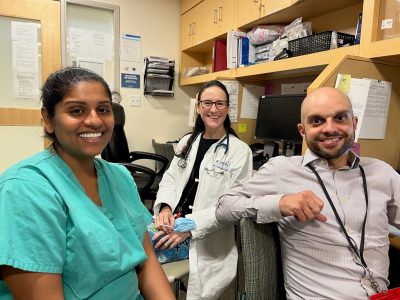Clinical Training

Adult Allergy and Immunology Clinics
The Adult Allergy and Immunology Clinic experience will provide the opportunity for trainees to broaden their knowledge base, hone critical thinking and develop effective communication skills that are necessary for an Allergy and Immunology consultant. Through the varied patient population, the trainee will learn about a multitude of Allergy and Immunology diseases and their various presentations. Trainees will learn first hand about the diagnosis and management of both common and unusual Allergy and Immunology diseases. Trainees will further their skills in interpretation of allergy skin tests (i.e., inhalant, venom, drug), in vitro diagnostics (e.g. allergen-specific IgE (ImmunoCAP)), quantitative immunoglobulins, complement levels, pulmonary function tests, chest plain radiographs, and CT scans of the chest and sinuses.. The rationale and implementation of specific immunotherapy (SIT) are mastered primarily in this setting. In addition, trainees will become competent in administering immunoglobulin replacement therapy and treating advanced atopic disease with biologics and immunomodulators (i.e., omalizumab, mepolizumab, dupilimab, mycophenalate, cyclosporine), as well as deciding and executing clinic-based challenges of foods and medications. These clinics are situated at Boston Medical Center and the West Roxbury Veterans Affairs Medical Center.
Pediatric Allergy Immunology and Respiratory Clinic
Trainees will have exposure to food allergy, atopic dermatitis and immunodeficiency evaluations, in addition to evaluation and management of pediatric allergic rhinoconjunctivitis and asthma. Trainees will further their skills at taking a pediatric history and physical; will learn the medications and doses used in pediatric allergy and asthma treatment; and will learn about skin testing and immunotherapy techniques and procedures in pediatric patients. Trainees will also participate in food challenges in a dedicated pediatric procedure unit.
Adult and Pediatric Consult Services
Trainees will see inpatient allergy and asthma consultations on both the adult medical and pediatric services. Trainees will see patients with drug allergy (i.e., antibiotic, ACE inhibitor, latex, anesthetic and aspirin), urticaria, angioedema, and anaphylaxis. They will learn about and design, as indicated, specific drug desensitization protocols and guide evaluation and management of patients with severe angioedema and anaphylaxis, typically in the Critical Care setting. On the pediatric side, consultations will be similar, but will also include more patients with asthma exacerbations. Communication with and education of the consulting service are important parts of these rotations.
Adult and Pediatric Procedures
Trainees will spend dedicated time learning the practical and theoretical aspects of skin testing (to aeroallergens and medications), patch testing for delayed hypersensitivity, drug desensitization, administration of biologics, and oral food and medication challenges, all in adult and pediatric patients.
Adult and Pediatric Asthma Clinics
The Adult and Pediatric Asthma Clinic experiences provide the opportunity for the trainee to focus on an important subset of Allergy and Immunology disease, asthma, in the context of clinics focused on management of more severe cases of asthma and other obstructive lung diseases. Trainees will learn to obtain a full history of environmental exposures, asthma duration and severity, medication adherence and technique and comorbid conditions. They will learn the role of peak flow, spirometry and full pulmonary function testing in the management of asthma, and learn about other diseases that may mimic asthma. In addition, trainees will learn the step-wise approach to asthma therapy and the advantages and disadvantages of the spectrum of asthma medications. The importance of an ongoing case management approach will be evident.
Ear, Nose, and Throat Rotation
Trainees will learn about the surgical approach to the evaluation and treatment of nasal polyposis, chronic rhinosinusitis, hoarseness, vocal cord dysfunction and gastroesophageal reflux. Trainees will become familiar with rhinolaryngoscopy from hands-on training with patients.
Dermatology Rotation
Trainees will learn about the history, physical exam, diagnostic testing and treatment of patients with atopic dermatitis, contact dermatitis and their mimics.
Quality Improvement and Patient Safety
Under mentorship from Program Faculty and Quality Leads at Boston Medical Center, trainees will design and execute a Quality Improvement and Patient Safety project. Preparation for this endeavor will be accomplished by completing the Institute for Healthcare Improvement Open School modules on Quality Improvement.